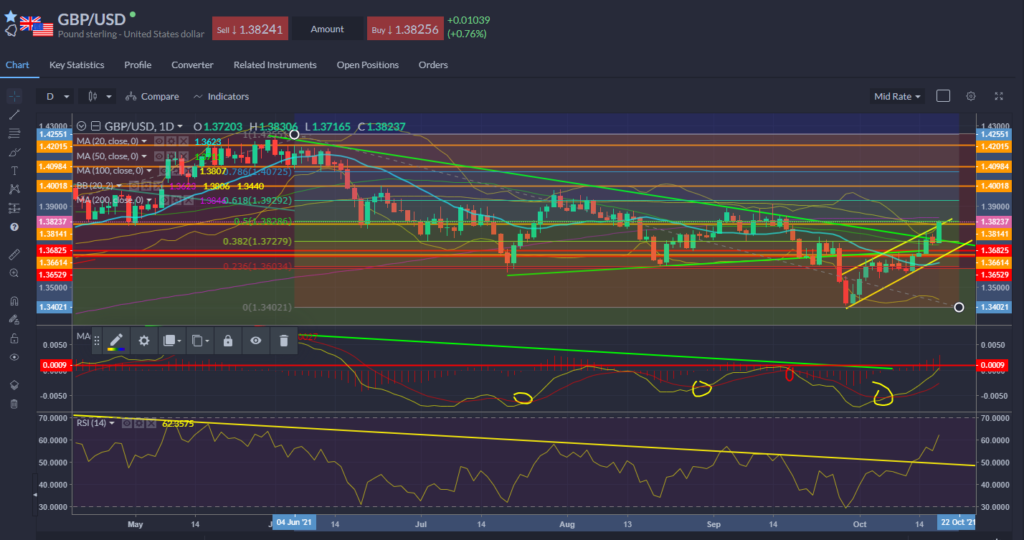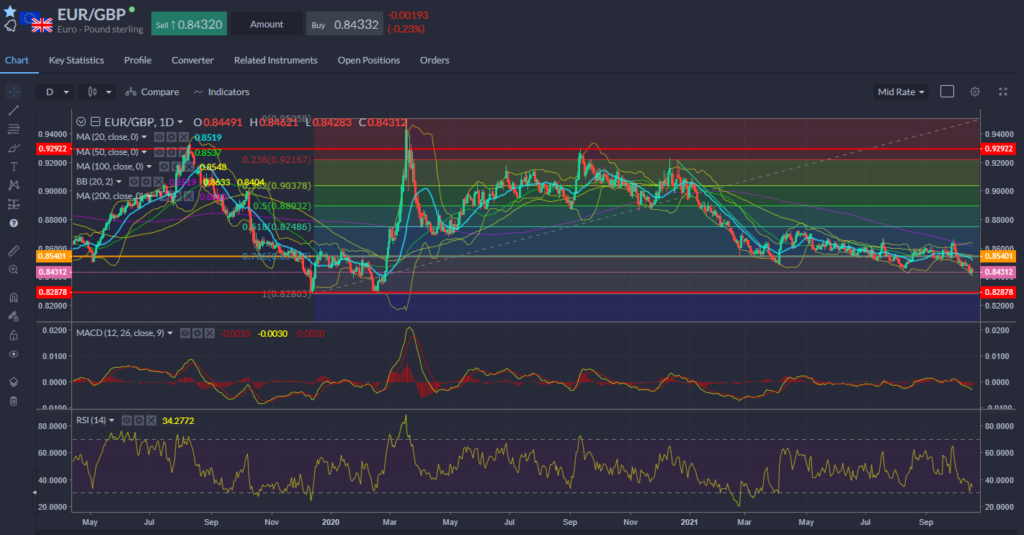
Tuesday Oct 19 2021 12:21

8 min
• GBPUSD hits highest in a month ahead of tomorrow’s CPI inflation print
• Hike in November fully priced by markets…
• But will the MPC hawks have enough votes?
Recent commentary from senior Bank of England officials indicates the Monetary Policy Committee (MPC) will raise interest rates when it next meets in November, barely over two weeks from now. Market positioning has also shifted significantly in recent weeks from a single hike next year to one this year and at least two next, with the base rate expected to hit 1% by August.
BoE members have had numerous occasions to push back against market expectations and have led traders towards a November hike as being the most likely outcome. Over the weekend governor Andrew Bailey stressed that the Bank of England “will have to act” to counter inflation. That’s one for team sticky – which if you are a regular reader, you will know I’ve been saying all along. “That’s why we, at the Bank of England, have signalled, and this is another such signal, that we will have to act,” Bailey said. “But, of course, that action comes in our monetary policy meetings.” Ah, but which policy meeting did he mean? Did he mean November – the market certainly thinks so, and there has been no push back on that. Failure to raise rates next month risks Bailey becoming the Old Lady’s second unreliable boyfriend and the inevitable disapprobation for her taste in gentlemen.
Inflation expectations in the UK increased to 4.1% in September from 3.1% in August of 2021. Actual inflation is also rising quickly. The latest Consumer Prices Index (CPI) rose by 3.2% in the 12 months to August 2021, up from 2% in July. The increase of 1.2 percentage points is the largest ever recorded increase in the CPI series, which began in January 1997. Soaring energy costs are a big factor, but the whole basket is seeing upwards pressure.
The reading of tomorrow’s CPI print is important. Another hot reading underlines the sense of urgency at the BoE. Cooler raises concerns that officials have got their communication muddled. It is once again expected to hit 3.2%.
Team sticky is winning for now but team transient have some cards up their sleeves. For instance, headline inflation would have been 0.3 percentage points lower in August 2021 without the Eat Out to Help Out discounts in August 2020. Demand destruction from higher prices may also start to feed into lower run rates for inflation.
Markets are pricing in a fairly aggressive tightening cycle by the BoE. 2yr gilt yields have hit a two-and-a-half year high. This could be premature – the MPC may not be as hawkish as recent signals indicate, but if it’s correct then the market is also anticipating that the Bank would quickly need to reverse its actions. Forwards and implied interest rate expectations point to inversion – higher rates at the front end, lower further out. This only implies the market believes the Bank would be making a ‘policy mistake’ by hiking prematurely. Others would point out that taming inflation is its core mandate.
Certainly, the BoE like all central bank is dealing with something rather new: a supply shock. Central banks’ policy toolkits are based around levers to drive demand when it is low. They cannot fix supply crunches and imbalances in the economy very easily by stimulating demand. Nevertheless, the Bank is clearly mindful that allowing inflation to run rampant would a) destroy its credibility and b) allow longer-term inflation expectations to become de-anchored. If supply-side worries are longer lasting than first thought, and demand stays robust, it seems prudent for the MPC to use what tools it has to lean on inflation. What’s clear is that the intense debate around the recent comments and change in market expectations shows the Bank is not doing a particularly good job of communicating its position. We may be left in a position where the MPC hikes a couple of times and then has to dial it back, which risks its credibility – albeit whether more or less than it would by allowing inflation expectations off the leash is an open question.
• MPC voted 7-2 to maintain QE, unanimous on rates
• Ramsden joins Saunders in voting to scale back the QE programme to £840bn, ending it immediately
• CPI inflation is expected to rise further in the near term, to slightly above 4% in 2021 Q4 – and the BoE signalled greater risk it would be above target for most of 2022
• Overall, Bank staff had revised down their expectations for 2021 Q3 GDP growth from 2.9% at the time of the August Report to 2.1%, in part reflecting the emergence of some supply constraints on output
• Shift in forward guidance: MPC noted ‘some developments … [since the August Monetary Policy Report] … appear to have strengthened’ the case for tightening monetary policy.
• Rate hikes could come early, even before end of QE: “All members in this group agreed that any future initial tightening of monetary policy should be implemented by an increase in Bank Rate, even if that tightening became appropriate before the end of the existing UK government bond asset purchase programme.”
But will it go for the hike? The MPC is relatively evenly split in terms of hawks and doves, so it is not abundantly clear if the recent messaging from some members – albeit including the governor – matches with the votes.
Bailey has sounded hawkish, and we know Ramsden and Saunders are itching to act. Huw Pill, the new chief economist replacing Andy Haldane has also sounded hawkish, though less so than his predecessor.
Commenting after UK inflation expectations hit 4% for the first time since 2008, he said: “The rise in wholesale gas prices threatens to raise retail energy costs next year, sustaining CPI inflation rates above 4 per cent into 2022 second quarter.” We place him in the ‘leaning hawkish’ camp.
On the dovish side, Silvana Tenreyro is highly unlikely to vote for a hike next month, calling rate rises to counter inflation ‘self-defeating’.
Deputy Governor Broadbent said in July that he saw reasons for the inflation tide to ebb. The spike in energy prices since then could lead him to change his mind but for now, we place in the ‘leaning dovish’ camp,
Rate-setter Haskel said in May he’s not worried by inflation, and in July said there was no need to reduce stimulus in the foreseeable future. He goes in the Dovish camp with Catherine Mann, who said last week that she can hold off from raising rates since markets are doing some of the tightening already. “There’s a lot of endogenous tightening of financial conditions already in train in the UK. That means that I can wait on active tightening through a Bank Rate rise,” she said.
That leaves Jon Cunliffe somewhat the swing voter. In July he stressed that inflation was a bump in the road to recovery. We look to see whether the recent spike in inflation and inflation expectations has nudged the likes of Cunliffe, Pill and even Broadbent to move to the Hawkish camp. It seems unlikely that governor Bailey would have pointed the market towards quicker hikes if he did already have a feeling for the MPC’s views on the matter.
| Dovish | Leaning dovish | Centre | Leaning hawkish | Hawkish |
| Tenreyro
Mann Haskel |
Broadbent | Cunliffe | Pill | Saunders
Ramsden Bailey |
GBPUSD: The hawkishness from policymakers and market repricing for hikes has supported £, though we do note some noticeable dollar weakness in Tuesday’s session that is flattering the view that it’s all BoE driven. Cable breaks new highs ahead of CPI, above 1.3820 to test the 50% retracement off the May peak. Bullish MACD crossover still in play, but starting to look a tad extended.

EURGBP Gains capped with a stronger EUR today, but has made a fresh 18-month high. BoE racing to hike against a much more dovish ECB ought to be positive, but yield curve inversion highlights the dangers of viewing FX trades purely from a CB tightening/loosening point of view.

